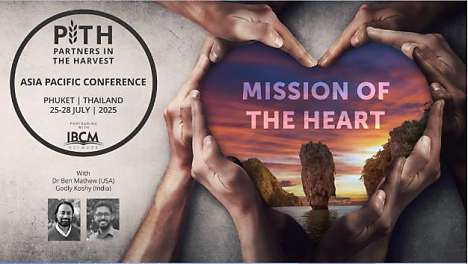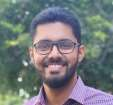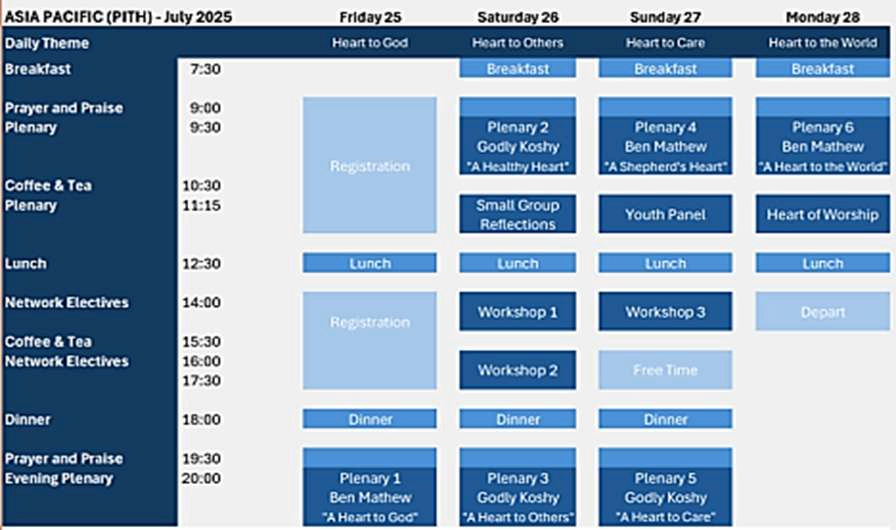Diakonia 2025 Volume 1
Partners In the Harvest 2025 – Phuket | Thailand
Onn (Ron Low)
registrar.dti@gmail.com

Welcome Message
Sawatdee! The word “Sawatdee” (สวัสดี) in Thai is a polite and common way to greet someone. ‘Sawatdee’ is not just a way to say hello; it’s a blessing of goodness, fairness, and prosperity. By saying ‘Sawatdee’, you’re wishing someone well in their life, reflecting the deep-rooted Thai value of caring for others’ well-being .
And this is exactly what the theme ‘Mission of the Heart’ stands for in this conference. We are acknowledging that the most important commandment is to love God and our neighbour as ourselves (Mk 12:28-34). What are missions if it is not motivated by our love for God and our neighbour? How is this reflected in the way we do evangelism, community outreach, and the way we disciple others?
1 Plenary Topics
1. Heart Connection – The importance of the heart in ministry and mission.
2. Soul Connection – Connecting with intention for wellbeing and growth (includes discussion/modelling soul-to-soul connection.
3. Heart Care – The importance of self-care in ministry (includes discussion on how to care for self in ministry).
4. Church Care – Pastoral Care in the Church (includes demonstration of how an elders’ meeting prioritising pastoral care looks like.
5. Youth Care – How to connect and care for youth today?
6. Care as Mission – Putting care at the heart of mission (includes panel illustrating Care as Mission).
Workshop 1. How to Counsel Others (Ron Low)
This workshop explores ways of counselling people in various seasons of life and at different stages of their faith. Participants will understand what goes into becoming a counsellor who can be a channel of God’s wisdom and comfort to people. Whether people are seeking support, direction, goal setting, coping strategies or working through personal challenges to improve wellness and life satisfaction, the Christian can learn to counsel people effectively. Case studies and discussions will facilitate learning while Q&A sessions will address specific concerns of participants.
Workshop 2. Creating a Church Culture of Care (David Smith)
The church is called to “build itself up in love” (Ephesians 4:16). Yet somehow in the frantic pace of church life the loving care of the heart is often overlooked. Caring is at the very heart of God. Does your church have a culture of care? What is a culture of care? What does God require of us as shepherds and carers of his people? And how can a local church practically create such a culture and ministry of care that honours the caring heart of God.
We will consider these and other questions in the following three sessions:
Session 1. “God Cares” In this workshop we look at how God cares for us and how we are called to care for others.
Session 2. “Caring Conversations” In this workshop we look specifically at creating space for intentional pastoral conversations and the listening and communication techniques that are required.
Session 3. “Care Strategies” In this workshop we look at how to create an effective care strategy for the local church.
Workshop 3. Counselling Issues (Anne Dryburgh)
Caring for suffering people in our churches is often complex. The things people go through and how they experience them can be complicated. To be able to help them well, it is crucially important to be informed about the issues that they face. In the counselling issues track, we will explore three areas that cause a lot of suffering and need a lot of care: abuse, depression, and the influence of social media. During each session we will seek to come to a basic understanding of the issue, how people respond, basics about what the Bible says, and some suggestions about how we can help.
Workshop 4. Caring as Mission (Ben Matthew)
Caring as a Mission within the context of pastoral care and counselling emphasizes the Gospel’s transformative power as a reflection of God’s love in action. It involves seeing the act of care not merely as a response to individual needs but as a missional endeavour that embodies the gospel’s call to heal, restore, and reconcile all nations. This approach bridges the gap between the church and the world, where the caregiver becomes a vessel of divine compassion, addressing emotional, spiritual, and relational brokenness. This elective will seek to help participants develop deep empathy, active listening, and culturally sensitive interventions and appreciate how ‘Caring as Mission’ fosters an environment where individuals experience holistic healing, and the church fulfils its role as God’s witness of restoration and hope to the world.
Workshop 5. Youth Identity (Godly Koshy)
Identity defines a person; it’s an amalgamation of various things that create a sense of self. As each person passes through life the different encounters allow for the development of one’s identity, like people, possessions, achievements, social media, beliefs and so on. Till adolescence the identity of a child is usually that of the parents but during the teenage years they start to explore and develop their own identity. So, it is all the more important for them to figure out their identity early on otherwise they will be in a place of identity confusion. The importance of providing an environment, a safe space to thrive and develop their identity is essential during this life stage. As parents, siblings, mentors and churches we have a very important role in helping them form their identity in Christ, not condemning them but answering their questions and patiently coaching them. We will look at some ways to help them in this pursuit of forming their identity
2 Plenary Speakers

DR BEN MATHEW (USA) – With his family from India and being born and raised in Canada, Ben has always appreciated the integration of cultures and ideas and was blessed to be involved in several ministries in his home, church, and community. With degrees in Counselling, Psychology, and Theology, Ben also enjoys the integration and collaboration of various academic disciplines. He earned his bachelor’s degree in biblical studies from Emmaus Bible College and continued his graduate work at Dallas Theological Seminary, earning an MA in Counselling and a PhD in Psychology from Northcentral University. Ben worked in the Dallas area for several years in private practice and at the nationally known Minirth Clinic, specializing in adolescent rehab and treatment of mental health issues. For the past two decades, Ben has been involved in higher education, helping to develop students and others to think critically and holistically about their faith, profession, and care for others. I have served for over 20 years at Emmaus Bible College in various positions, most recently as a Professor and Chair of the Counselling Psychology department. Ben is a Board-Certified Counsellor (NCC) and currently serves as a Professor of Clinical Counselling in the Graduate Counselling Programs (MA & PhD) at Columbia International University (ciu.edu). He also maintains a small counselling practice as a Licensed Professional Counsellor in South Carolina, where he lives with his wife, Jenna, and their four children.

GODLY KOSHY RAJU (India) -Godly along with his wife Becky and son Evan are missionaries serving in Pune, India. They have been involved in ministry for over 10 years in Bangalore and now Pune. They are both engineers but as the Lord called them for ministry, they pursued their Bible and Counselling from Emmaus Bible College. Godly did his masters in Family Life Education from Bangalore. Currently they are helping with a church plant in Pune, youth ministry with the assemblies and Crossroads and as a Counsellor at Urban India Ministries. He is part of the faculty for the MA in counselling offered by UIM. Godly is the author of a book “Basic Counselling” used by Emmaus Academy, India and has helped establish Streams of Water – India, a team of youngsters that helps reach assembly youths in various ways. In his free time, he loves spending time with the community, exploring new foods, biking, playing sports and aquascaping.
3 Conference Schedule
DATES: 25-28 July 2025
CONFERENCE CENTRE: NH Boat Lagoon Phuket Resort Address: 22, 22 Thep Krasattri Rd, Ko Kaeo, Mueang Phuket District, Phuket 83000, Thailand
AIRPORT SHUTTLE: Provided from Phuket Airport to Conference Centre

4 Post-Conference Mission Exposure Trip
Options (29th July – 2nd Aug 2025) to Chiang Mai, Phuket & Bangkok, Thailand; Bukit Mertajam, Penang, El Shaddai Centre, Klang, Malaysia and Palawan, Philippines.
Mission Objective: To engage PITH’s participants in a cross-cultural experience that fosters spiritual growth, deepens their understanding of global missions, and builds relationships with the local mission agency and or local church, while supporting. assisting and encouraging their ongoing ministry efforts.
Mission Goals
1. Spiritual Growth- Provide opportunities for PITH’s participants to deepen their faith through prayer, reflection, and witnessing God’s work in a cross-cultural context.
- Promote faith as participants step out of their comfort zones to a new environment.
- Help participants gain a greater understanding of the host culture, its strengths, challenges, and how the Gospel is expressed uniquely within it.
- Promote cultural humility by listening, learning, and building mutual respect with the local community.
- Strengthen and encourage the host church or ministry through fellowship, prayer, and shared worship experiences.
- Support their ongoing efforts by participating in their ministries and showing solidarity in their challenges.
- Expose participants to the realities of global missions and the diversity of the global church.
- Inspire a deeper commitment to the Great Commission, whether through prayer, giving, or future involvement in missions.
- Build meaningful relationships with the local community that reflect the love and unity of Christ.
- Foster connections that create potential opportunities for future partnerships and collaboration in ministry.
- Assist in activities that contribute to the local ministry’s efforts in a way that is sustainable and aligned with their long-term goals.
- Serve as learners, working under the leadership of the local church/mission agency to ensure cultural appropriateness and effectiveness.
- Encourage the participants to reflect on what they learn during the trip and consider how they can apply those lessons in their daily lives.
- Encourage the participants to share their experiences and inspire their home churches to engage in missions.
